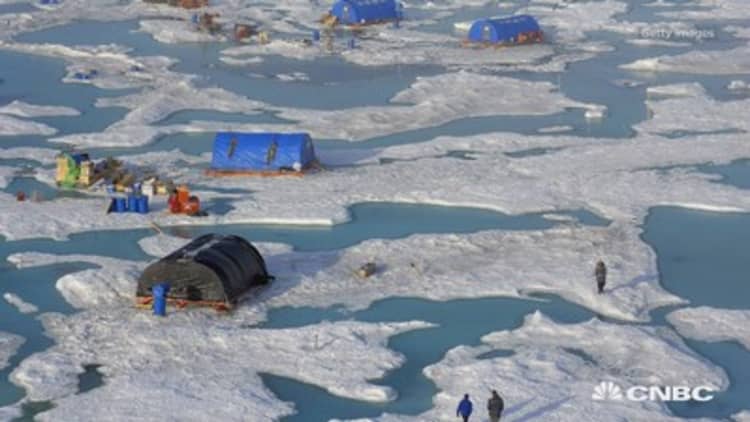
Royal Dutch Shell is the latest of the oil majors to either abandon or postpone its Arctic ambitions, as the dwindling price of oil puts more and more big exploration projects on ice.
The company announced its withdrawal on Monday, stating that it had found insufficient oil and gas at its Burger J well, approximately 150 miles from Barrow, Alaska, to warrant further exploration.
It could take a hit of up to $4.1 billion as a result, Shell said in a statement on Monday — but could shave around $1 billion off its annual exploration budget.
"Shell will now cease further exploration activity in offshore Alaska for the foreseeable future. This decision reflects both the Burger J well result, the high costs associated with the project and the challenging and unpredictable federal regulatory environment in offshore Alaska," the FTSE 100-listed company said.
The Arctic is likely the biggest untapped area for petroleum on Earth, holding an estimated 20 percent of the world's untapped resources. But Shell's decision to pull out follows similar scrapped or postponed projects from peers, at a time of record low oil prices, regulatory uncertainty and high-profile campaigns from environmental campaigning groups like Greenpeace.
"I think that in the Alaskan offshore Arctic, most that haven't pulled out already may do so. Shell was pretty much the last man standing in any size," Malcolm Graham-Wood of Hydrocarbon Capital told CNBC on Monday.
Several big oil players have pulled back from the Arctic following a slump in oil prices that has seen the cost of a barrel of crude tumble to below $50 by January 2015 from $110 in June 2014. This has placed huge pressure on companies and their highly expensive exploration projects — in May, Shell Oil President Marvin Odum told CNBC that drilling in the Arctic cost roughly $1 billion per year.

Earlier this year, Norwegian oil group Statoil delayed its Johan Castberg project in the Arctic Circle, citing falling oil prices and high expected operating costs. Russia's Rosneft also postponed exploration this year and France's Total pulled out of a natural gas project in the Russian Arctic. And in December 2014, Chevron suspended its Arctic drilling program in the Beaufort Sea due to low oil prices.
Then, on Tuesday, Russia's environmental ministry announced the postponement of all drilling operations on its Arctic Shelf for up to three years, according to media and other reports. As well as low oil prices and high costs, Russian energy companies like Rosneft and Gazprom with ties to President Vladimir Putin have also had to contend with international sanctions that have hit their ability to raise long-term funds and invest in expensive deep-water and shale oil projects.
Shell insisted on Monday that its reasons for pulling out of the Arctic were "purely technical" and did not reflect either pressure from weak prices or fears of repercussions from any oil spill in a fragile environment.
"We drilled a well and it was dry, so for the foreseeable future we are pulling out… the amount of oil found wasn't actually of commercial levels. This was why we pulled out, rather than oil prices," a Shell spokesperson told CNBC.
However, energy analysts said that oil prices would have played a role in the decision, with some also citing concerns about lawsuits from environmental groups and the burden of increasing federal regulations.
"I think the low prices combined with disappointing well results led to Shell's decision to halt their activity," Andy Lipow of Lipow Oil Associates told CNBC on Monday.
"Even if the drilling results had been modest, I think that the low oil prices would have resulted in a slowdown in Shell's Arctic investments. They simply need much higher oil prices to economically extract oil out of the very high cost Arctic region.
"It is possible that the potential for continued environmental lawsuits went into Shell's thinking as the lawsuits may have resulted in additional project delays and higher costs for Shell," he added.
On Monday, Greenpeace's international executive director described Shell's announcement as a "defining day" for the Arctic.
"It's a huge victory for the millions of people who stood up against Shell and a disaster for other oil companies with interests in the region. Shell has gambled big and lost big, both in terms of financial cost and its public reputation," said Greenpeace's Kumi Naidoo in a statement on the group's website.
However, Chris Main, an energy strategist at Citi, noted that oil prices had put a number of expensive drilling projects on a backburner, not just those in the Arctic.
"The low oil price is putting under question a huge number of higher cost curve projects — oil sands, LNG (liquefied natural gas), deepwater, Arctic et cetera — and there has been a number of either a) project FID deferrals or b) project cancellations. And given the expected price path over the next few years, I would expect these to very well continue," he told CNBC via email.
—By CNBC's Katy Barnato. Follower her on Twitter @KatyBarnato.


